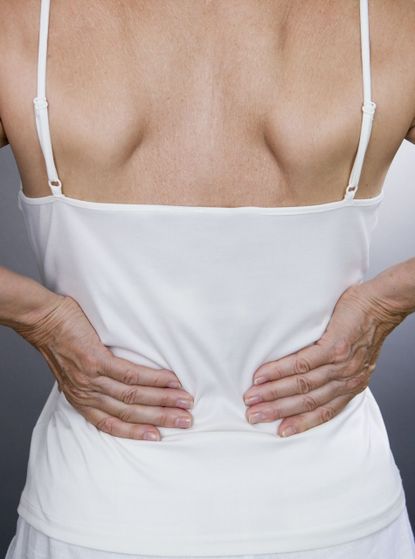Everything you need to know about osteoporosis


Osteoporosis is a difficult condition to live with, but unfortunately, it's all too common. In fact, it's estimated that more than 500,000 people receive hospital treatment resulting from the disease every year. Overall, it affects three million people across the UK, so if you're suffering - trust us, you're certainly not alone.
Osteoporosis is, put simply, a condition which weakens bones and increases risks of fractures. It's most commonly suffered in older people, given their already more fragile bones.
But what causes osteoporosis? It's all about bone density and how quickly you lose it. People who lose bone density much faster than others are at a much higher risk of osteoporosis.
But who is most at risk? It's a condition that's far more likely to hit females than the males. And that's because when women reach the menopause, they lose bone density more rapidly. If a woman enters the menopause early - that is, before the age of 45, she can be more at risk of developing osteoporosis.
Other causes of osteoporosis
According to the NHS, these things could also contribute to the condition...
- - Long-term use of high-doseoral corticosteroids
- - Other medicalconditions- such as inflammatory conditions, hormone-related conditions, or malabsorption problems
- - A family history of osteoporosis particularly history of a hip fracture in a parent long-term use of certain medications which can affect bone strength or hormone levels
- - Having a lowbody mass index (BMI)
- - Heavy drinking and smoking
So, how do you know if you've got osteoporosis? Well, the symptoms of osteoporosis are not actually like that of other illnesses...
Symptoms of osteoporosis
Osteoporosis doesn't actually present any symptoms other than fractures, so will usually only be diagnosed if a small fall or incident causes a break. Most commonly, they'll occur in the hip, wrist, or spine, but can also happen in the arms or pelvis.
Sign up for the woman&home newsletter
Sign up to our free daily email for the latest royal and entertainment news, interesting opinion, expert advice on styling and beauty trends, and no-nonsense guides to the health and wellness questions you want answered.
Often, a fracture will be caused by a small, seemingly inconsequential thing if caused by osteoporosis, such as a light bump or even a cough or sneeze. If you notice intense pain after any of these things, or by a simple tumble, head to A&E or your local GP.
Is osteoporosis painful?
Yes, it can be, mostly because the generally expected symptom is a fracture, which can cause severe pain when it occurs. However, it's expected that the pain will ease off after the fracture is treated by a medical professional.
Can I have a bone density test?
If it's suspected by your doctor that you may be suffering with osteoporosis, they'll be able to do a bone density test - also called a DEXA scan. This measures your bone mineral density - but don't worry, it's not as painful as it sounds! It usually takes around five minutes, and you shouldn't really feel anything.
Your bone density will then be compared to that of a healthy young person, and the difference is then calculated.
- - above -1 SDisnormal
- - between -1 and -2.5 SDis defined as decreased bone mineral density compared withpeak bone mass
- - below -2.5 isdefined as osteoporosis
Osteoporosis treatment, what are the options?
Generally, osteoporosis is treated simply by repairing and taking care of fractures that have occurred, and by using osteoporosis medications to help strengthen your bones.
Good exercises for osteoporosis
According to the National Osteoporosis Foundation, there are two types of exercises that are key if you want to keep your bones as strong and healthy for as long as possible and avoid being diagnosed with osteoporosis. These are categorised as muscle-strengthening exercises, and weight-bearing exercises, each designed to ward off the condition.
Weight-bearing exercises can be both high and low impact. They can include:
- - Dancing
- - Hiking
- - Jogging/running
- - Stair climbing
- - Tennis
- - Using elliptical training machines
- - Doing low-impact aerobics
- - Using stair-step machine
- - Fast walking on a treadmill or outside
The NOF also recommends muscle-strengthening exercises such as lifting weights or using weight machines.
Osteoporosis prevention: what you can do
So is there any way to prevent this disease from happening? Well, while there's no immediate preventative cure available yet, there are things you can do to help ward off the condition and keep your bones in tip-top shape.
It's a great idea to maintain a good exercise regime and to eat as healthily as possible. Some experts recommend Vitamin D supplements too.
If you're older and at risk of developing osteoporosis, it would be worth considering reducing your alcohol intake and stopping smoking.
Amy Hunt is an experienced digital journalist specialising in homes, interiors and hobbies. She began her career working as the features assistant at woman&home magazine, before moving over to the digital side of the brand where she eventually became the Lifestyle Editor up until January 2022. Amy won the Digital Journalist of the Year award at the AOP Awards in 2019 for her work on womanandhome.com.
-
 How old was James Corden in Fat Friends and where is the Netflix show set?
How old was James Corden in Fat Friends and where is the Netflix show set?One of James Corden's earliest TV series, Fat Friends, is now streaming on Netflix
By Jess Bacon Published
-
 Is Unlocked: A Jail Experiment real? The Netflix social experiment series explained
Is Unlocked: A Jail Experiment real? The Netflix social experiment series explainedNetflix's new reality series, Unlocked: A Jail Experiment, sees a social experiment take place in a US jail
By Jess Bacon Published